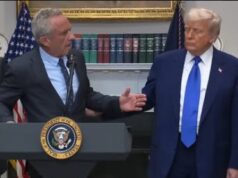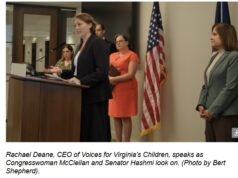From Protect Our Care:
|
PHOTOS AND VIDEO: Congresswoman McClellan Joins Advocates, Doctors and Community Members in Tazewell as Republican Medicaid Cuts Threaten to Close Rural Hospitals Across the Commonwealth |
|
| U.S. Rep. Jennifer McClellan (VA-04) speaks to the threat that Medicaid cuts will present to rural hospitals at an Aug. 28 press conference in Tazewell as Dr. David Mitchell, a hospitalist from Abingdon, looks on. (Photo by Bert Shepherd). |
|
View photos from the event HERE and a recording of the event HERE. |
| TAZEWELL, Va. — In case you missed it, U.S. Rep. Jennifer McClellan (VA-04) joined advocates, doctors and community members at Tazewell County Public Library on Aug. 28 to sound the alarm on the recently-passed Republican cuts to Medicaid that will put rural hospitals across the commonwealth at risk of closure.
Rural hospitals operate on slim margins. Six rural hospitals in Virginia, including one in Tazewell, have been identified as at risk of closure once the Medicaid cuts go into effect. Many others are at risk of cutting services. “Whether it’s in Waverly or Emporia or Tazewell or Abingdon, places that already were health care deserts could lose the only providers that are there, because without Medicaid and the funding they receive, they just can’t afford to provide the care,” said Congresswoman McClellan. “And you would have more uninsured people who, when they do find care and have to drive even farther to get it, they still won’t be able to afford it. So we’re sounding the alarm. It is not too late to turn this around.” The cuts were passed as part of the president and Congressional Republicans’ so-called One Big Beautiful Bill Act, which contains the largest cuts to Medicaid in history in order to fund tax breaks that will disproportionately benefit the ultra-wealthy. As a result, more than 300,000 Virginians are projected to lose their health care. Rural Virginia will be particularly hard-hit, with KFF finding that rural areas in the commonwealth stand to lose more in Medicaid spending than those in any other state, with the exception of Kentucky and North Carolina. “The changes to Medicaid that are rolling out in the coming months will cut off health care for many eligible patients,” said Dr. David Mitchell, a hospitalist from Abingdon. “And so these patients will delay important medical care. They will stop taking medications that they can’t afford, for example. Their medical conditions will worsen, possibly become life-threatening. They will also have an additional fear of potential high medical bills that they simply cannot afford.” “A few years ago, I took care of five different women during about a year’s span who all had cancer of the uterus,’” said Dr. Bickley Craven of Abingdon. “All of these women were uninsured and lacked health care coverage and access. All delayed seeking medical attention in spite of having obvious symptoms. When these symptoms of this particular cancer are seen early and the disease is diagnosed and treated early, you can have very good outcomes. Unfortunately, if not, then you often have death, which could be avoided, and unfortunately, some of these women suffered that problem, and it was all because they had no health insurance and delayed seeking care. They didn’t want to put the burden of the expense on their family. The cuts in Medicaid funding planned by the Republicans will cause that scenario to be repeated.” U.S. Rep. Morgan Griffith (VA-09) voted for the cut and praised the new $35 co-pays that — for the first time ever — Medicaid patients will now have to pay for certain services. Jason Pritchard of Bristol, President of the Board of Directors of SAARA of Virginia, spoke to the importance of rural hospitals in combating the opioid epidemic. More than 36,000 Virginians – and 26,000 in West Virginia – rely on Medicaid to cover Medically Assisted Treatment, also known as MAT, to treat their substance use disorder. “[Medically-Assisted Treatment] is considered the gold standard for treatment, and [people in recovery] go to hospitals like the one here in Tazewell, which provides addiction services,” said Pritchard. “The historic cuts to Medicaid that Congress passed last month mean people currently in recovery thanks to Medicaid may be at risk of relapse if they cannot continue their care. It also threatens the rural hospitals, such as the one here in Tazewell. When rural health facilities close, fewer people can achieve and stay in recovery. And let me tell you, if someone is experiencing an overdose, the difference between life and death may literally be how quickly they can get to a hospital.” Tazewell community member Martha Wollbrinck spoke to the importance of having a hospital nearby. “Depending on the local hospital [Carilion Tazewell Community Hospital], that’s kind of nice, because that’s right there and right down the road. So that’s a huge plus,” said Wollbrinck. “I had breast cancer in 2000, and so … it’s really convenient to be able to go there and get a mammogram, as opposed to 40 minutes that way, 45 minutes this way.” “Tazewell is my home, even if I no longer physically live there. But six months ago, I had to make the incredibly difficult decision to move to North Carolina in order to have access to specialized care for my husband, who has dementia and other chronic illnesses. If Tazewell had offered the care my husband needed, I would have gladly stayed here, as I love this community and the life we had built here,” said Regina Sayers, formerly of Tazewell. “The $1 trillion cut to Medicaid will only make things worse [for rural health care]. “Yet our community’s Congressman said these cuts would “end up being minimal”. However, having to uproot our entire lives because of a lack of investment in rural health care is not minimal. Placing our local hospital at risk of closure is not minimal. And kicking over 300,000 Virginians off their health insurance because of cuts to Medicaid and the Affordable Care Act is not minimal.” Advocates at the event called for Congress to reverse course and follow the example of Republican U.S. Sen. Josh Hawley, who voted for the cuts but has since introduced legislation to restore some of the Medicaid funding. Rep. McClellan has also cosponsored the Protecting Health Care and Lowering Costs Act, a bill to reverse all of the health care cuts from the One Big Beautiful Bill Act, including those to Medicaid, and permanently extend the Affordable Care Act’s enhanced premium tax credits. Protect Our Care and The Committee to Protect Health Care partnered to sponsor the Tazewell event, which is the fourth stop of a statewide tour that also saw events in Richmond, Charlottesville and Roanoke. Penny Blue of Union Hall, who spoke at the tour’s Roanoke stop, was featured in a USA Today story that ran last weekend on the threat that rural communities face as they anticipate the cuts. Protect Our Care has launched Hospital Crisis Watch, a website tracking hospitals that have closed or announced cuts as a result of the Medicaid cuts. A rural clinic in Nebraska has already announced its intent to close as a result of the forthcoming cuts. Lt. Governor Winsome Earle-Sears advised Virginians “don’t panic” when a reporter asked for comment about the concerns of rural hospitals. |















